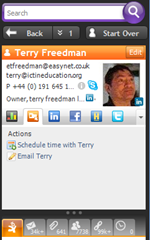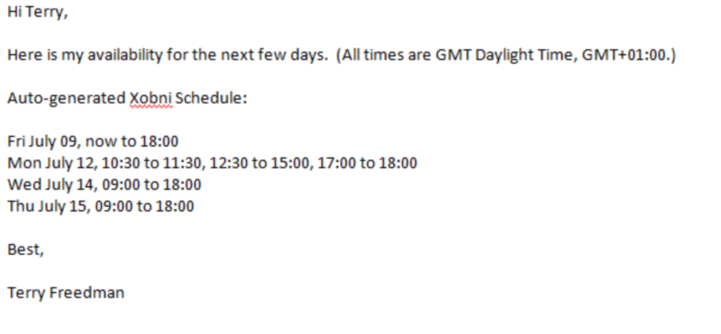Moving, by Terry Freedman
Important email alert: I've moved!
Here’s a heads-up about a few changes I’ve made that temporarily caused my email address (terry@terry-freedman.org.uk) to be unavailable.
Read More12 ways of disconnecting in a connected world
How can one disconnect in today’s world, and why would one want to anyway?
Read MoreWhat is the appropriate form of address in email?
 Here is the text of a note from the Post Office, quoted in “Berry and Co”, which was written by Dornford Yates and published in 1920:
Here is the text of a note from the Post Office, quoted in “Berry and Co”, which was written by Dornford Yates and published in 1920:
Sir
I beg leave to inform you that your telegram handed in at the Grosvenor Street Post Office at 10.2 am on the 26th June addressed to Reply paid Hamilton Smythe Fair Lawns Torquay has not been delivered for the reason indicated below.
ADDRESS NOT KNOWN
I am, Sir, Your obedient servant,
WB
Postmaster
Email problem–sorted!
 If you tried emailing me earlier and received a bounced email message for your trouble, it’s all OK now. Here’s what happened…
If you tried emailing me earlier and received a bounced email message for your trouble, it’s all OK now. Here’s what happened…
The value of email in a recession
Two-tier email system
 Teachers looking for material with which to furnish their lessons on how technology affects society need look no further than email. This form of communication has affected in at least three ways what might be called “disposable time” – the time one has left after the essentials like eating and sleeping have been taken care of.
Teachers looking for material with which to furnish their lessons on how technology affects society need look no further than email. This form of communication has affected in at least three ways what might be called “disposable time” – the time one has left after the essentials like eating and sleeping have been taken care of.
Please! No More Mantras!
Xobni
I am in love. I wasn’t expecting this to happen, it was just one of those things. I was in my local supermarket, browsing through the latest copy of PC Advisor, just going about my business. Then, one thing led to another and, well, what can I say?
The object of my affections is Outlook. I have used Outlook for my email on and off over the years, but have never really liked it. Over-featured and unwieldy, it’s slow at finding emails and hopeless at finding conversation threads. It has some good features, admittedly, which is why I stick with it, but that slow grinding away of the search function drives me insane.
However, Xobni, which is reviewed in PC Advisor, changes all that, and does so much more. In fact, I don’t think it’s an exaggeration to say that Xobni makes Outlook work as it was meant to; it’s what Microsoft should have done to make Outlook not merely usable, but useful.
What Xobni does is index your emails and analyse them, and places an extra pane in your Outlook view. Searching is incredible, because Xobni works the way people do. Take a typical scenario. I am about to phone you to discuss the ICT Vision document you’ve commissioned me to write. What will I need before I pick up the phone? Your phone number, obviously. The email containing the brief you sent me. The follow-up email you sent clarifying a couple of points. And, for when I send you an email confirming what we end up agreeing in the phone conversation, the name and email address of your colleague to whom you always cc your emails.
To obtain all this information, I simply type your name into the search box, and I see something like this, virtually instantly most of the time.

As you can see, it has collated my contact information so that I have your email address(es), phone number, Skype link, and Twitter, Facebook and Linked-In details (if I’ve added you as a friend in those applications).
A row of icons at the bottom of the panel gives me instant access to our email conversations, attachments sent, and other potentially useful information. As for the name and email address of your colleague, that’s contained further down in the panel shown in the screenshot (which I’ve cropped to avoid giving other people’s details).
 Xobni can also suggest meeting timesThe application is also linked to the Outlook calendar. If I click on “Schedule time with …” an email like the one shown is automatically generated. Xobni has looked at my calendar for the next few days and suggested times when I have no appointments.
Xobni can also suggest meeting timesThe application is also linked to the Outlook calendar. If I click on “Schedule time with …” an email like the one shown is automatically generated. Xobni has looked at my calendar for the next few days and suggested times when I have no appointments.
Another feature is that it gives you lots of metrics. For example, it will tell you the times of day that people respond to your emails, the purpose being to enable you to call them when they’re most likely to be in the office.
There’s a free version of Xobni that works just fine. The paid-for version costs $29.50 and has an advanced search function and works on more than one .PST file. I tried the free version, and liked it so much I bought the upgrade. I think in terms of time and my blood pressure it paid for itself on the very first use. You can find out more about the program and download it from the Xobni website.
A (Hopefully Temporary) Email Problem
One day after telling a colleague that one of my email providers has experienced problems only three times in the last ten years, there was, and still is, what they call a "major outage". What that means is that if you have sent me an email and not received a response, that's because I haven't yet received it. If you resend it to terry[at]terry-freedman.org.uk that should get to me with no trouble (I'm reluctant to say will get to me: look what happened the last time I prasied an email service).
I think my ISP has sorted out their technical problems. My emails have started to flood in -- flood being the operative word. Oh no....!  Not MORE email??!!
Not MORE email??!!
An Email Retrospective
I was looking for a particular video I made, to illustrate an article about the forthcoming edition of Computers in Classrooms (the fantastic free newsletter available only from this website), when I came across this video about email.
I think it was the first video I ever made for the internet, and as it was my first attempt I got the video settings wrong. In addition, there was no script, just Elaine and I looking through old emails to see if anything had changed. It was our way of celebrating ten years on the web, back in 2005 (it's ok, I know: we really do need to get out more).
Anyway, it's so boring that it's quite funny. Well, I think so anyway.
It includes one of those awful spam emails which contain just random sentences, except that back in 2005 I don't think I'd quite cottoned on to the fact that it was spam.
Elaine had suggested a friendly wager, that the emails would reveal that nothing had changed over ten years. I think I would say that she won.
I'll leave you with one final thought: what can be sadder than the fact that in 2005 I still had emails going back to 1996? How about the fact that, five years later, I've still got them?!
Well, we all need a hobby.
On a more serious note, I do find it interesting, every few years, to look through old emails to find out what I was concerned with, and what the burning issues of the day were. We lose too much personal and organisational history in today's ephemeral society, which is a pity: it's good to reflect on the journey now and again.
Vlog01.mpg
Uploaded by terryfreedman.
28 million emails
Erm, that's how many emails were languishing in the Trash server on my webmail account. I thought I'd emptied the trash folder every so often, but obviously not. I wonder if that's what has been causing my web mail to be so incredibly slow?
I am now going off to sit in a darkened room where I can hang my head in shame at allowing that many spam messages to accumulate.
Email: The Electronic Leash?
I am not sure why it is, but whereas channels such as Twitter and Facebook are pleasant and liberating, email is somehow depressing and restrictive. Perhaps it's because it is associated with work rather than pleasure, or because it is, psychologically, more demanding. Perhaps, in my case, right now, it is because I have just returned from the #Naace2010 conference (which I shall write about in due course) -- and to 3,697 emails.
No, the conference was not 3 months long, it was 3 days in total. And yes, they did have wi-fi, so in theory I could have dealt with some of the deluge whilst at the conference. Here are a few of my thoughts on the matter. My reaction to nearly 4,000 emails waiting for me
My reaction to nearly 4,000 emails waiting for me
The trouble with alerts
Setting up alerts to tell you when something has been downloaded is, usually, good. In my case, I find that seeing a few downloads of something I've published, each time I check my mail, lifts my spirits. Thus it was that when I published the Amazing Web 2.0 Projects Book a few days ago, I set up an alert of this nature. I should have turned off the alert before I left for the conference, but in my naivety I assumed there would be a few hundred downloads at the most.
I could not have been more wrong.
As of a few minutes ago, it has been downloaded 4,758 times, and the majority of the 3000+ emails were the associated alerts.
So my conclusion about this is: disable any automated alerts and things of that nature before leaving home for more than a day or two!
Web mail can be slooooow
Checking my email at the hotel was a nightmare. For some reason, my main provider's web mail service is always really slow. It's cope-able with when there are just a few emails, but not when there are over 90 pages of messages. It got to the stage where each page was taking several minutes to load. I can get email on my phone, but I've learnt from past experience that if the number of messages becomes too large, the phone grinds to a halt. I found that out in Phoenix, Arizona a few years ago, when I spent a merry hour in an organic wholefood café (I don't know why I put that detail in, but I just felt the need to give the complete picture!) furiously deleting stuff and even uninstalling apps I'd never used.
Conferences are for conferencing
The other thing is that, whilst I try and keep on top of what's coming in to my email inbox whilst away, I don't want to miss the opportunities for networking and so on that a good conference provides. So unless the email is from a client, or urgent in some way, then (assuming I'd seen it at all) I would normally wait until I return and deal with it then. I constantly meet colleagues at conferences who miss entire sessions in order to deal with emails, and I can see why they would do that, but I think I am doing my clients, subscribers and readers a better service in the long run by participating in the conference as much as I can.
Sleep is important too
I know from my days of studying and teaching economics that the rarer a commodity is, the greater its value. Well, at conferences sleep tends to be placed in that category, and that has a twofold effect on my dealings with email.
Firstly, on business grounds, I don't think answering emails late at night when you've been on the go for 19 or 20 hours is especially sensible.
Secondly, faced with the choice of grabbing 4 or 5 hours' sleep, or checking emails, surely the more sensible option is the former?
And now the deluge
And so, today and no doubt part of the weekend will involve my going through the emails, responding and, hopefully, catching up on work too. So, if you happen to be one of the people who have emailed me and have not as yet had a reply, please accept my apologies.
As it may be a bit of a wait, you might like to download that book I mentioned. Its 121 pages of good stuff, from some fantastic practitioners. And no doubt of more practical use than War and Peace, which was going to be my other reading suggestion.
But seriously, you no doubt have better things to do than wait around for responses to emails, but if you have a moment or two I'd be interested in how you deal with the inevitable email mountain we typically find on returning from a conference or vacation.

